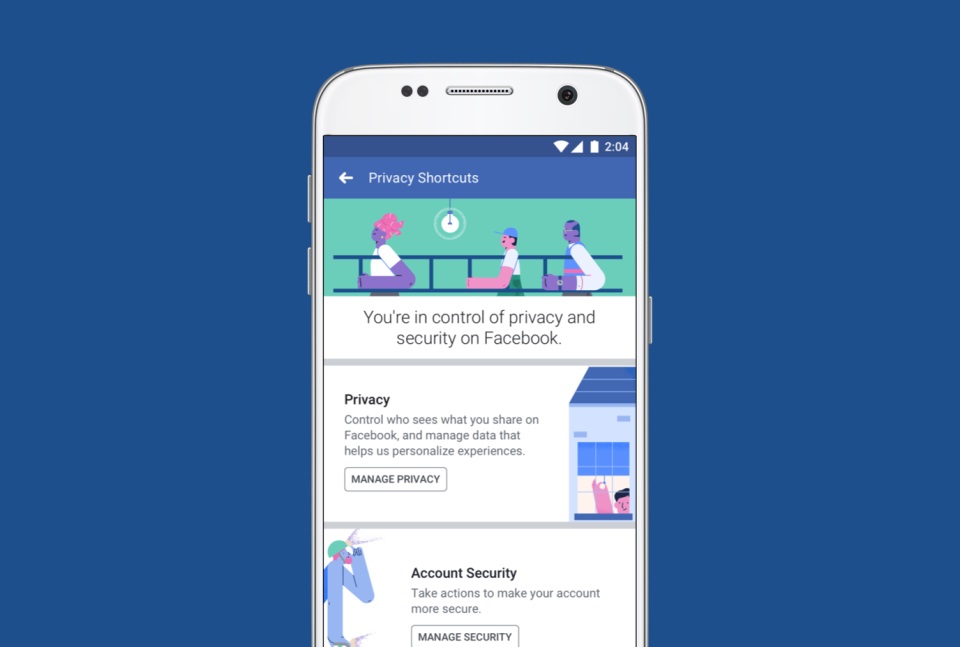Facebook Stops Playing Hide-And-Seek With Its Privacy Settings

Facebook just keeps on changing. Shortly after the company revealed plans to change the information developers can gather about its users, it announced that it's going to make it easier for people to manage their privacy settings. The update might appear to numerous privacy-related controversies, which have shown how much data Facebook collects and how lax it is about protecting that info, but it's likely part of Facebook's attempt to abide the European Union’s General Data Protection Regulation (GDPR) rules before they go into effect on May 28.
First a brief overview of the scandals. The first involved Cambridge Analytica's collection of information about 50 million Americans using a quiz app that scraped data from users' friends; that information was then used to influence the 2016 presidential election. That scandal has led to its own series of mini-scandals regarding the Palantir surveillance tool-maker's use of Facebook data and lawmakers' requests to learn more about how Facebook protects its users. The second issue revolves around Facebook's collection of Android phones' call and SMS history via Messenger.
What's Changing
Facebook responded to these issues by vowing to better control the information developers gather via its platform. Now the company has said it plans to simplify its privacy settings "in the coming weeks" to make it easier for people to safeguard their data. The changes fall into three categories: "making data settings and tools easier to find," introducing a "new privacy shortcuts menu," and providing "tools to find, download, and delete your Facebook data." (With the expectation for the third , we assume, being that you'll delete your data instead of your account.)
Making it easier to find privacy settings is easy enough to explain. Instead of burying these options across various pages deep within the settings page, Facebook plans to put privacy tools front-and-center. Facebook said these settings used to be "spread across nearly 20 different screens." Once these changes go through, they'll be found in one place. The company said that it's also "cleaned up outdated settings so it’s clear what information can and can’t be shared with apps." That should help make it so people don't need tutorials to figure out how to access these tools.
The new privacy shortcuts menu is a little more involved. Facebook outlined what you'll find there:
Make your account more secure: You can add more layers of protection to your account, like two-factor authentication. If you turn this on and someone tries to log into your account from a device we don’t recognize, you’ll be asked to confirm whether it was you.Control your personal information: You can review what you’ve shared and delete it if you want to. This includes posts you’ve shared or reacted to, friend requests you’ve sent, and things you’ve searched for on Facebook.Control the ads you see: You can manage the information we use to show you ads. Ad preferences explains how ads work and the options you have.Manage who sees your posts and profile information: You own what you share on Facebook, and you can manage things like who sees your posts and the information you choose to include on your profile.
The final change is also pretty straightforward. Facebook said it's introducing a feature called Access Your Information (catchy!) that pretty much does what it says on the tin: it will provide "a secure way for people to access and manage their information, such as posts, reactions, comments, and things you’ve searched for" as well as "delete anything from your timeline or profile that you no longer want on Facebook." Access Your Information will also let you download your data, store it wherever you please, and move it to other services, when available.
Stay On the Cutting Edge: Get the Tom's Hardware Newsletter
Get Tom's Hardware's best news and in-depth reviews, straight to your inbox.
Why It's Changing
All these changes coming out around the same time Facebook has found itself embroiled in controversy is a good look for Facebook. It almost seems like the company is responding to complaints within days instead of weeks, months, or years. But that probably isn't actually the case--Facebook would've had to make many of these changes anyway as a result of GDPR. Those looming regulations have prompted companies like Microsoft--and now Facebook--to change things up rather than run afoul of EU regulators. (For the umpteenth time.)

Nathaniel Mott is a freelance news and features writer for Tom's Hardware US, covering breaking news, security, and the silliest aspects of the tech industry.
-
kuhndj67 I'll believe it when I see it... they make money selling that data, there's no way they're going to give you the ability to REALLY control your data. The other thing that would be required to actually provide some data security would be to never let data out of their systems regardless how much some customer is willing to pay for it (hint hint... Joe Public 'aint the customer, he's the meat for sale)... I'm sure they're not going to do that either.Reply